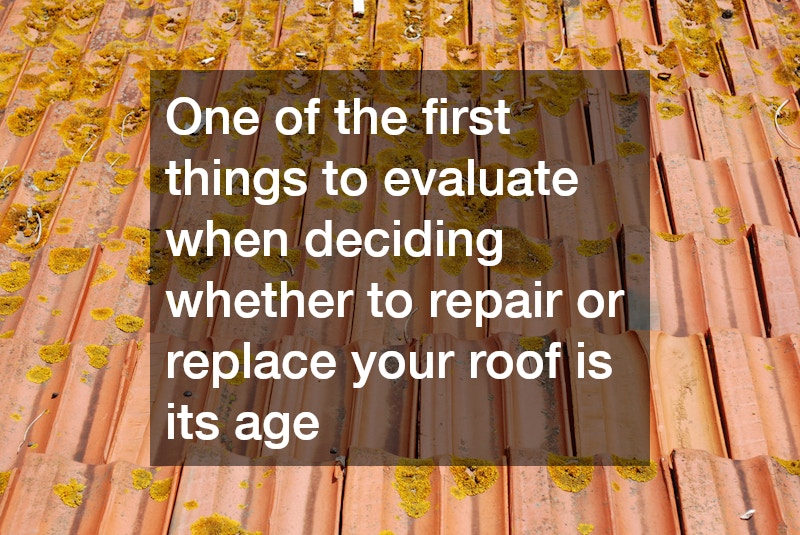Disclaimer: Benro Properties. This site provides home improvement content for informational purposes only.
As a homeowner, making decisions about your roof can be daunting. One of the most challenging choices is deciding whether to repair or replace your roof. This comprehensive guide addresses the key factors you should consider when making this important decision.
1. Assessing the Age and Condition of Your Roof
One of the first things to evaluate when deciding whether to repair or replace your roof is its age. Different roofing materials have varying lifespans; for example, asphalt shingle roofs typically last between 20 to 25 years.
If your roof is nearing the end of its expected lifespan, replacement might be more cost-effective in the long run.
Beyond age, the overall condition of your roof is crucial. Look for signs of significant wear and tear, such as missing or curling shingles, leaks, or water damage in the attic. Minor issues like a few missing shingles can often be addressed with simple repairs, but extensive damage may suggest the need for a full replacement.
Consulting with a professional roofing contractor can provide valuable insight. These experts can conduct a thorough inspection, giving you a clear understanding of your roof’s condition. They can also advise on whether a repair or replacement would be the best option based on their findings.
2. Evaluating Costs: Repair vs. Replacement
Cost is a major factor influencing the decision between repairing or replacing your roof. Repairs are usually less expensive than a full roof replacement, especially if you address issues early. However, repeatedly paying for repairs can eventually surpass the cost of a new roof.
When evaluating costs, consider the extent of the damage and the pricing for both repairs and replacement. A roofing contractor can provide estimates for both options, helping you to make an informed decision. They often factor in the nuances of local climate, roofing materials, and labor costs.
Another financial aspect to consider is the potential increase in property value. A new roof can significantly boost your home’s resale value, a benefit that may offset the upfront replacement costs. Think long-term and weigh these potential gains against the expenses.
3. Energy Efficiency and Modern Roofing Technologies
The energy efficiency of your home could be improved with a new roof. Modern roofing technologies incorporate enhanced insulation and reflective materials that reduce energy consumption. This energy efficiency can lead to significant savings on your utility bills over time.
Repairing an older roof may not provide the same benefits, as older materials may not meet current efficiency standards. A modern replacement could be more aligned with your sustainability goals, a critical consideration for environmentally conscious homeowners. When you engage a roofing contractor, ask about energy-efficient options that suit your home and climate.
Moreover, advances in roofing materials offer more than just energy savings. Newer designs are often more durable and resilient against harsh weather conditions, extending the lifespan of your roof. Consequently, investing in a replacement might lead to fewer repairs in the future, making it an economical choice in the long run.
4. Anticipating Future Maintenance Needs
Considering future maintenance needs can influence your decision as well. Older roofs tend to require more frequent upkeep, leading to ongoing expenses and inconvenience. A new roof installation can reduce future maintenance needs significantly.
When assessing future maintenance, weigh the hassle of repeated repairs against the peace of mind that a new roof provides. Although upfront costs for replacement are higher, they often come with comprehensive warranties that cover both materials and labor. This assurance can be invaluable, saving you time and stress down the line.
Finally, evaluate your ability to manage maintenance personally versus hiring professionals. A roofing contractor can help maintain both new and existing roofs. They’re able to provide consistent maintenance services, ensuring your roof remains in top condition.
5. Weighing Aesthetic and Personal Preferences
Your roof shapes your home’s appearance, and sometimes aesthetics are a decisive factor. A new roof can transform the look of your home, adding curb appeal and a modern touch. This is especially true if you opt for contemporary materials and design options.
If aesthetic upgrades or personalization are important to you, a full replacement may be preferable. With options like color choices, design patterns, and materials, a new roof can provide the style and uniqueness you desire. Consult with a roofing contractor to explore the various possibilities available to you.
Ultimately, the decision between repairing or replacing your roof is personal and should align with your goals, budget, and future plans for the property. Take the time to thoroughly evaluate all factors and seek professional advice. A roofing contractor will ensure that your investment is aligned with both your practical needs and personal preferences.

